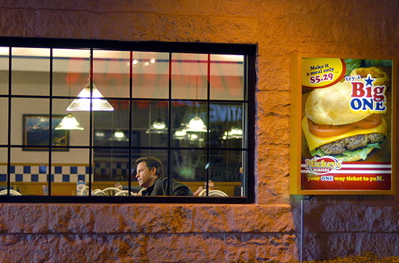
Popcorn Taxi is an organisation in Australia that presents advance screenings of films, frequently with the films’ directors on hand afterwards to answer questions and give interviews.
Popcorn Taxi programmes that I have attended include Mysterious Skin (painful but phenomenal), Thank You For Smoking (hilarious and, coupled with Jason Reitman’s short films, an all around excellent evening) and Monster House (the interview providing genuine insight into the film that had me appreciating it ever more).
Generally, you get the impression that the people present have enjoyed the film they’ve seen. Fast Food Nation did not supply me with that feeling. I got the impression that quite a few people were disgruntled.
I didn’t think it was that hot, either.
A fictionalised adaptation of Eric Schlosser’s Fast Food Nation, this film is yet another ensemble film, in the style of Love Actually, Crash and Syriana.
In fact, my first reaction when the credits began to roll was “at least it was better than Syriana”, an experience that I had this year akin to trying to convince myself not to be bored. “Akin” isn’t exactly accurate, as that was exactly what it was like.
The film follows a few groups: Greg Kinnear as the marketing vice president of fictional fast food chain “Mickey’s”, Ashley Johnson as the suddenly “interested” teenager Amber, and a group of illegal immigrants from Mexico, led by Catalina Sandino Moreno and an unrecognisable Wilmer Valderama, who looks like he’s going to get legitimate acting work now that he no longer has to play the “Funny Ethnic” on That 70’s Show.
Richard Linklater’s film essentially lurches from one situation to the next, abandoning Greg Kinnear’s storyline without any sense of resolution beyond a bumper of resignation (a move which he claims establishes as a film that is not of Hollywood), and generally not trying to tell a story. He shot it on 16mm to make it look like a documentary, but it’s not a documentary.
What it is is depressing, but not for the right reasons. I’m not generally a fast food eater so I was not horribly affected by what I saw on the screen. However, I am a student, and watching students sitting around drinking beer and talking about the environment and how people are mean to cows … that’s the height of depressing.
Now, I don’t party like a “normal” student, but please! These people exist out there, and I think they should lighten up somewhat! Meekly talking about politics and sticking it to the man, please!
On the positive side of the “student” parts of the film, all of the scenes shared by Ashley Johson, Patricia Arquette and Ethan Hawke sparkle and indicate that the film could have been somewhat better. The “wetbacks”, who will garner absolutely no sympathy from many, many people, had some good ideas behind them but were underutilised and also abused by Bobby Cannavale’s manager character.
Fast Food Nation culminates in the abbatoir of Uniglobal Meat Production, and Linklater said that he hoped to produce that shock after we’ve learned to care for the characters, but it has been as manufactured as the meat it presents and thus stripped of all meaning.
The situation as it stands in real life is unresolved, and so too is this story. Yet, feeling nothing for these characters and simply throwing them off the screen creates a distinctly unsatisfactory conclusion. Personally, I feel that Fast Food Nation was the combination of a large amount of talent for rather lacklustre results.
The interview and Q&A with Linklater thereafter did not illuminate much of the process; he was surprisingly inarticulate, with the exception of when he spoke of Michael Apted’s 7 Up series. It’s okay to speak about other people’s films, but if you can’t tell us about your own, we’re stuffed!
Overall, a let down. I’ll admit I was expecting Linklater to be a cool guy, but the interviewer (from Variety) hogged the questions and the audience could not really get any in.
Still, I’m looking forward to A Scanner Darkly.

No Responses